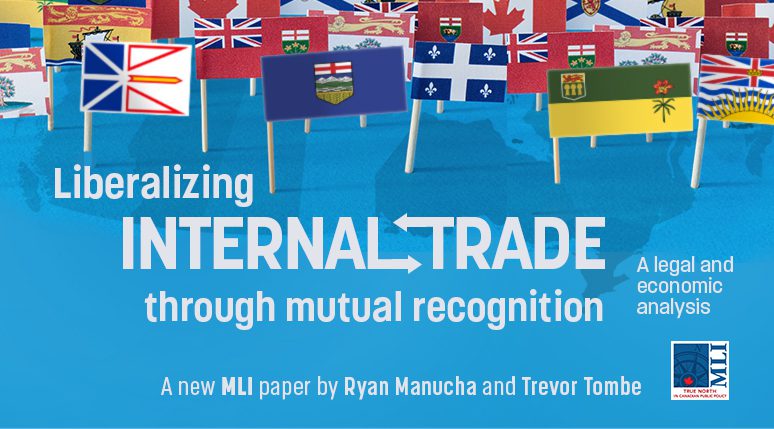OTTAWA, ON (September 20, 2022): Annually, Canada’s economy loses billions of dollars of productivity due to a web of rules, regulations, and restrictions between provinces. However, solving Canada’s internal trade woes has remained a stubborn problem. How can the provinces untie this trade knot?
One potential solution is mutual recognition. In MLI’s latest paper, titled Liberalizing internal trade through mutual recognition: A legal and economic analysis, authors Ryan Manucha and Trevor Tombe explore the policy, finding that it may represent an important next step toward liberalizing internal trade.
Manucha and Tombe examine the practical, economic and legal considerations at play, including the institutional landscape of internal trade in Canada, comparisons with similar countries like Australia, and the benefits and trade-offs of mutual recognition. Additionally, the authors will be participating in an MLI webinar panel next week to explore the topic in greater depth. You can register here.
But what is mutual recognition? Simply, it is a policy whereby “regulatory requirements met for one provincial and territorial government automatically satisfies requirements for another,” write Manucha and Tombe. No province would have to change to a common set of standards; they would simply agree that the standards of other provinces are recognized as legitimate.
Why does it matter? The authors find that internal trade costs imposed by parallel regulatory regimes are quite significant. A web of regulations makes it more difficult for businesses to operate across provincial lines, increasing delays and administrative costs which meaningfully effect productivity.
“Canada’s economy could increase by between 4.4 and 7.9 percent – a significant gain of between $110 and $200 billion per year – if internal trade barriers were eliminated by mutual recognition policies,” say Manucha and Tombe. The authors are careful to note that these long-run gains would take many years to realize. In any case, “the large magnitude of potential gains suggests the increasing effort and attention by policy-makers on this issue is well placed.”
Despite the unambiguous and large economic benefits from mutual recognition, there are trade-offs to consider. If trade is liberalized, economic disruption will be inevitable, with the authors noting that increased competition and workforce migration may place disproportionate pressures on smaller and lower productivity regions. Impacts will be felt unequally across provinces or industries. Furthermore, unilateral or partial adoption of mutual recognition between provinces may complicate redistribution and pose political challenges.
Nonetheless, mutual recognition’s benefits are substantial, the risks are generally low, making the policy well worth considering. The authors argue that the policy could be implemented in select industries where risks are particularly low and benefits are high, such as in finance. Such potential for quick wins demonstrates why “mutual recognition should be an important part of the policy conversation.”
To learn more, read the full paper here:

Additionally, be sure to register for our webinar here.
***
Ryan Manucha is widely published and a frequent commentator on the topic of Canadian interprovincial trade. Trevor Tombe is a Professor of Economics at the University of Calgary and a Research Fellow at Calgary’s School of Public Policy.
For more information, media are invited to contact:
Skander Belouizdad
Communications Officer
613-482-8327 ext. 111
skander.belouizdad@macdonaldlaurier.ca






